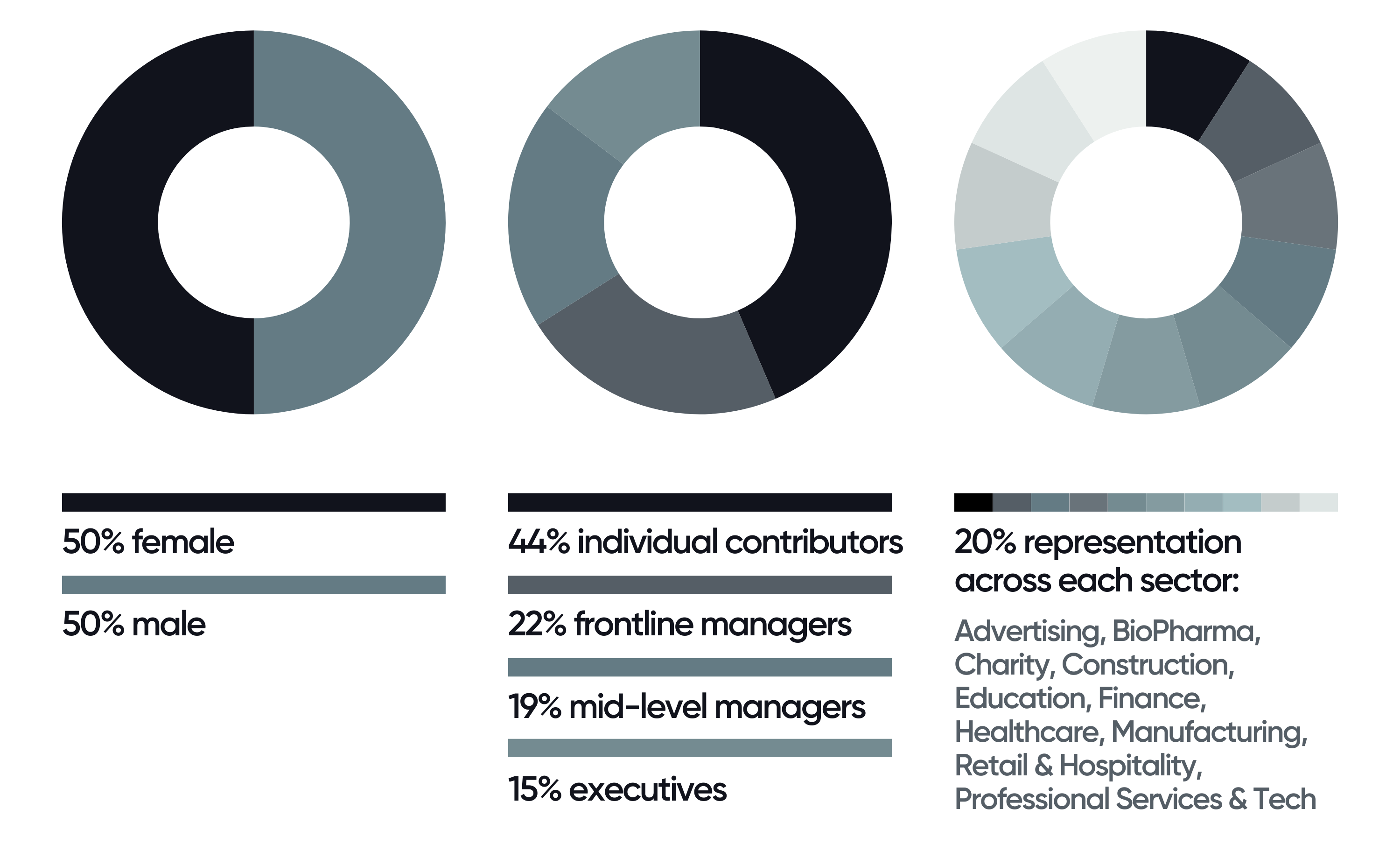The State of Employee Wellbeing in the Workplace: 2024
Insights from Great Place To Work’s
UK Workplace Culture Population Study

Employee wellbeing is a holistic concept encompassing individuals' subjective experiences of their working lives. It is an outcome and personal assessment of how people feel about their working lives; for employers it is all about creating the conditions for them to thrive.
This concept covers the entire spectrum of an employee's work life—from mental and physical health to social connections and financial stability. By nurturing these components, employees are empowered to thrive, finding success and fulfillment both within their professional roles and in their personal lives.
High levels of employee wellbeing have been shown to improve organisational performance including higher productivity, lower attrition, reduced absenteeism, as well as greater loyalty and discretionary effort.
Leveraging our research-based Trust Index Survey questions, we conducted a UK population study, surveying 2,200 employees across 11 sectors, to evaluate employee well-being in the typical UK workplace.
How employees feel at the typical UK workplace
The past few years have been particularly challenging for employers and employees alike, due to the pandemic and cost-of-living crisis. In the immediate aftermath of the pandemic, employee wellbeing became a priority for company leaders. Yet, despite years of investment, organisations are still struggling to fully meet employees' needs and achieve high measures of wellbeing in the workplace.
Our research found that only half (55%) of workers at a typical UK workplace report a high state of wellbeing at work.
While this is an improvement compared to our previous population study in 2021, the journey towards holistic employee wellbeing is far from over. This underscores the continued importance of a robust employee wellbeing programme that meets the needs of today's workforce.
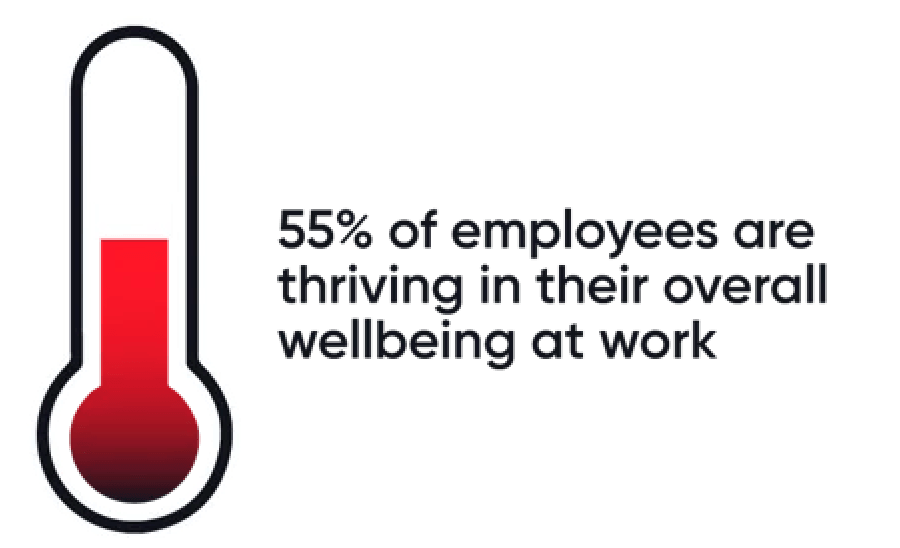
55%
of employees look forward to coming to work.
3 in 5
employees feel they are encouraged to balance their work life and their personal life.
56%
of employees report fair pay for themselves and their co-workers.
The leading UK sectors for wellbeing in the workplace
We collected data from employees across key UK sectors and evaluated them using our Extended Wellbeing Index. This Index measures holistic workplace wellbeing across areas such as Interpersonal Relationships, Job Design & Fulfilment, Work-Life Balance, Psychological Safety, Mental, Physical & Financial Health, and General Evaluation of Wellbeing. Each sector received a Extended Wellbeing Index score and was ranked from highest to lowest based on their overall wellbeing experiences.
The leading UK sectors for
wellbeing in the workplace
wellbeing in the workplace
We conducted a population study, collecting data from employees across key UK sectors, and evaluated it using our Extended Wellbeing Index. This Index measures holistic workplace wellbeing across areas such as Interpersonal Relationships, Job Design & Fulfilment, Work-Life Balance, Psychological Safety, Mental, Physical & Financial Health, and General Evaluation of Wellbeing. Each sector received a Extended Wellbeing Index score and was ranked from highest to lowest based on their overall wellbeing experiences.
| Rank | Sector | Wellbeing Index Score | Interpersonal Relationships | Job Design & Fulfilment | Work-life Balance | Psychological Safety | Mental, Physical & Financial Health | General Evaluation of Wellbeing |
| 1 | Tech | 62 | 68 | 65 | 68 | 69 | 66 | 62 |
| 2 | BioPharma | 61 | 67 | 59 | 73 | 66 | 69 | 61 |
| 3 | Charity & Not-for-profit | 60 | 68 | 60 | 71 | 71 | 56 | 58 |
| 4 | Professional Services | 59 | 67 | 58 | 65 | 70 | 62 | 58 |
| 5 | Finance | 57 | 60 | 57 | 64 | 64 | 62 | 56 |
| 6 | Advertising, Media & Marketing | 56 | 66 | 54 | 63 | 67 | 59 | 58 |
| 7 | Construction, Engineering & Property | 56 | 65 | 58 | 62 | 68 | 55 | 54 |
| 8 | Retail | 53 | 60 | 56 | 59 | 64 | 51 | 50 |
| 9 | Healthcare | 53 | 62 | 50 | 59 | 68 | 59 | 52 |
| 10 | Manufacturing & Production | 52 | 59 | 53 | 58 | 61 | 57 | 51 |
| 11 | Education & Training | 52 | 62 | 57 | 50 | 61 | 54 | 47 |
Key sector findings
- Wellbeing experiences vary significantly across industries.
- Tech and BioPharma are leading the way as the top-ranking sectors for wellbeing, attributed to strong interpersonal relationships, effective job design, work-life balance, and robust psychological safety measures.
- Charity & Not-for-Profits excel notably in work-life balance and psychological safety compared to other wellbeing dimensions.
- Healthcare sector shows a notable weakness in job design & fulfilment.
- Education and Manufacturing & Production are the lowest-ranking sectors in our Wellbeing Index, with both scoring particularly low in the general evaluation of wellbeing and work-life balance.
Further statistics and insights into the state of workplace wellbeing in the UK
01
Employees across the UK are expecting more wellbeing support from their employers
Only fifty-five percent of employees at a typical UK workplace feel that their organisation genuinely prioritises wellbeing. This highlights a common sentiment: there's much more that companies can do to support employee wellbeing.
So, what do employees want most? Perks and wellness programs often fall short of addressing the true needs of employees for enhancing their wellbeing. Instead, the key to fostering a healthier workplace lies in focusing on fundamental areas such as achieving a balanced work-life, effectively managing workloads, and providing robust training for managers. These foundational elements are critical for businesses aiming to drive better wellbeing practices.
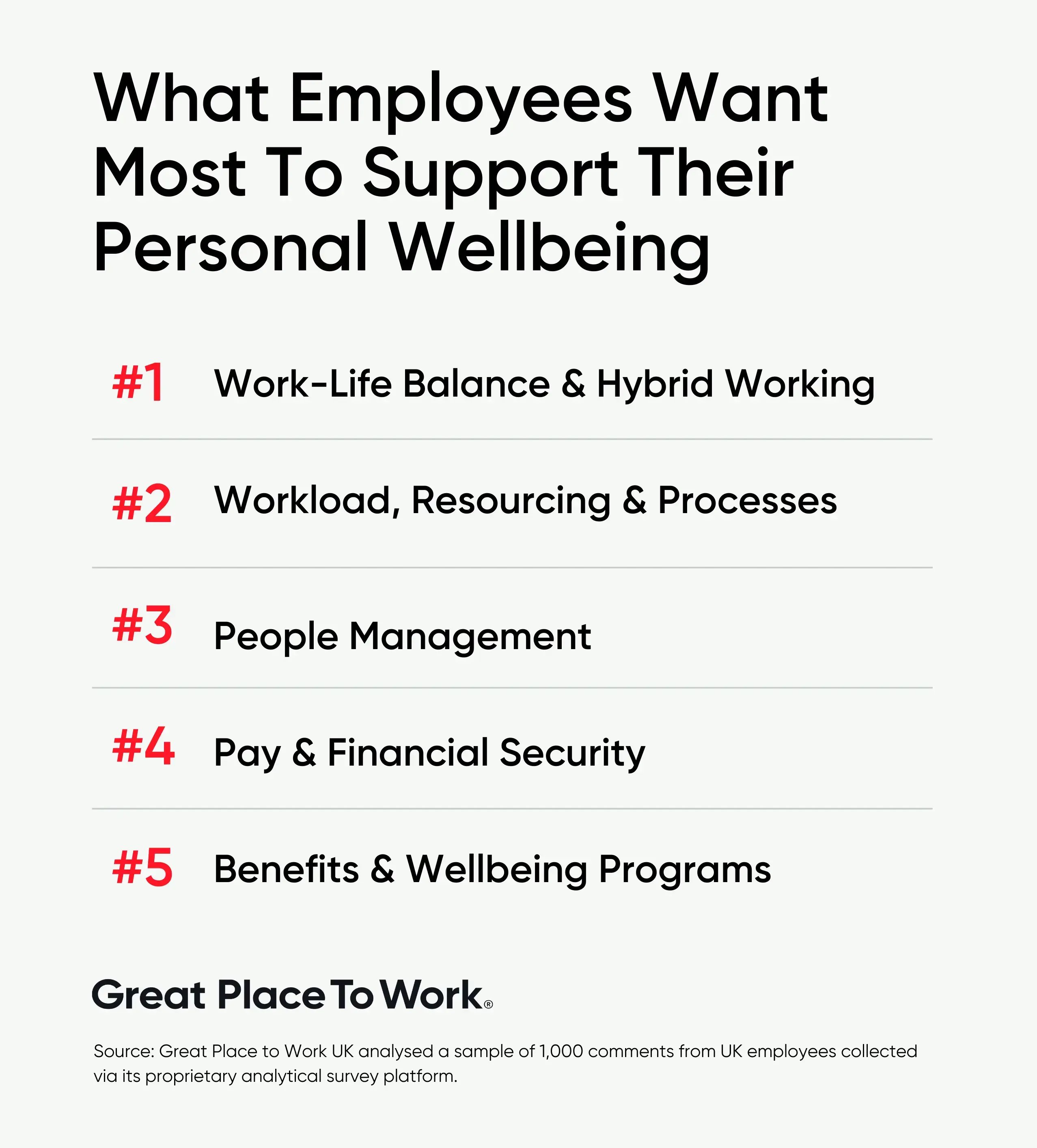
02
Stress is rampant across all industries and job roles, with frontline managers feeling the burn
Over half (53%) of UK employees say that the demands of their job cause them excessive stress. Stress was highest among frontline managers, with just 37% saying that the demands of their job do not cause excessive stress. In comparison, 47% of employees/individual contributors and 44% of mid-level managers reported the same.
As a result, frontline managers tend to report the lowest levels of wellbeing among the working population. The combination of high stress, excessive workloads, the demands of leading a team, and other pressures significantly impacts their wellbeing. These challenges can cause isolation, burnout, and feelings of being undervalued.
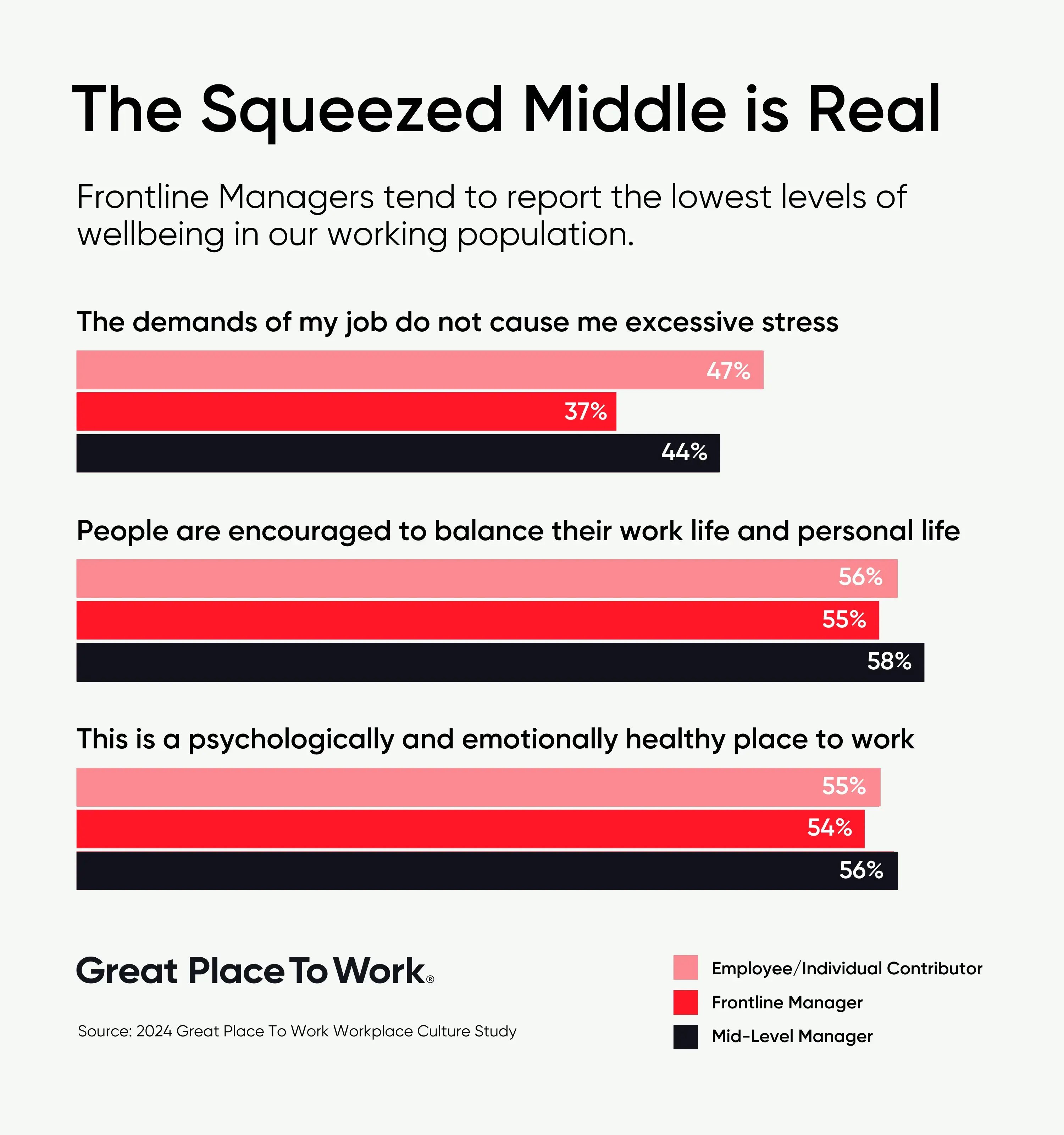
03
One third of UK employees say they often think about looking for a job at another organisation
In the UK, 36% of employees frequently think about leaving their current company. Given that nearly half (45%) of employees also say they don't look forward to coming to work, the importance of wellbeing in retaining staff comes sharply into focus.
Prioritising employee wellbeing can significantly increase retention, boost employee advocacy, and strengthen employee engagement.
Employees who experience high levels of wellbeing in the workplace are 3 times more likely to intend to stay with their employer.
They are also 3 times more likely to go the extra mile in their work.
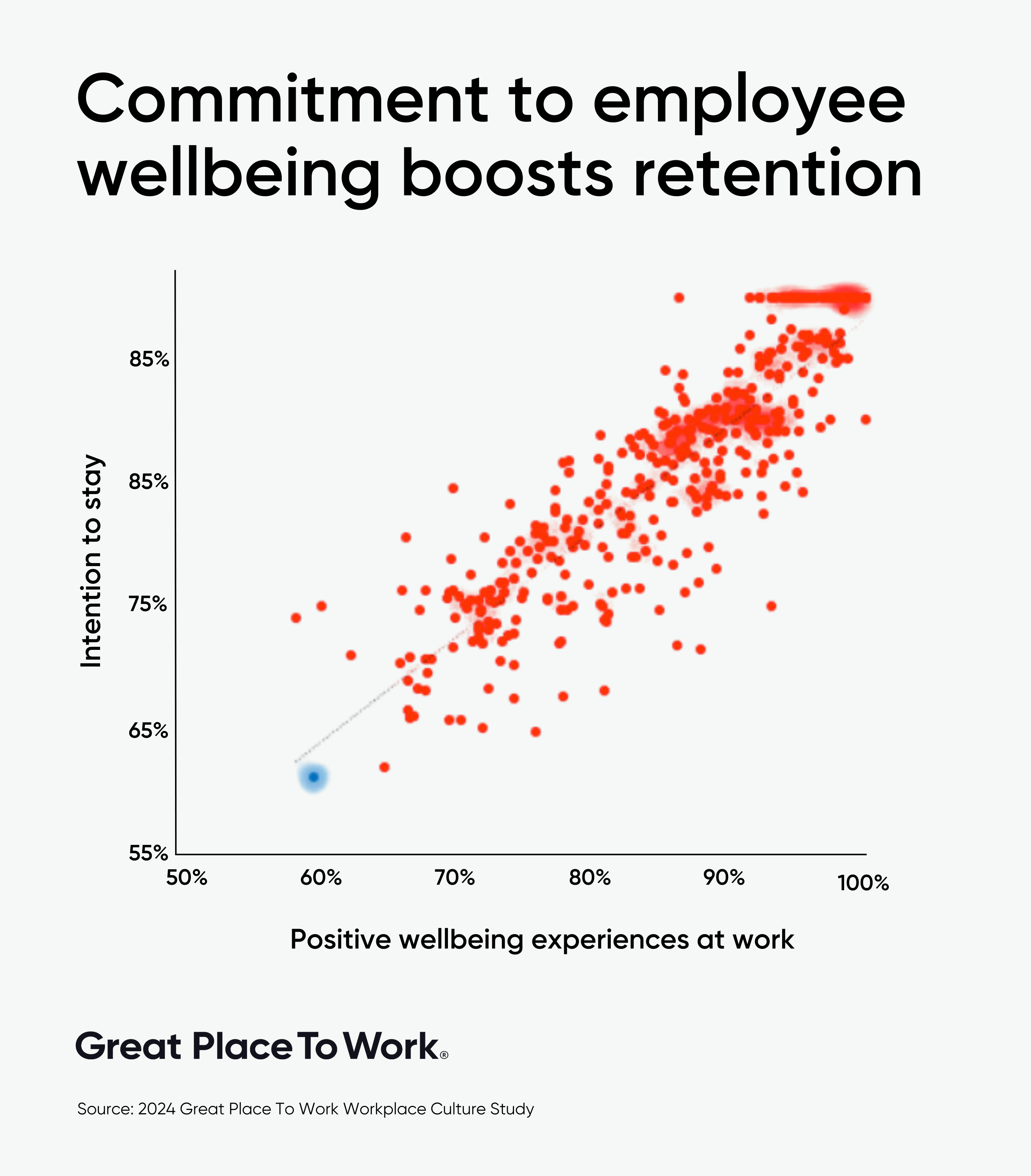
1 in 3
3x
more likely to stay when experiencing high levels of wellbeing.
61%
Only 61% of employees want to stay at their job for a long time.
Job loyalty across the UK
% of employees that want to stay at their company for a long time
2021
2024
We've seen a notable 6% uptick in job loyalty since our last population study, with 61% of employees saying that want to stay at their company for a long time. However, the level of commitment varies across different industries.
Retail & Hospitality show a lower intent to stay, with only 56% of employees expressing a desire for long-term commitment to their current roles. Manufacturing & Production and Education closely follow at 58%. On the other hand, the Advertising and Tech sectors have the highest intent to stay, with 67% of employees saying that want to stay at their company for a long time.
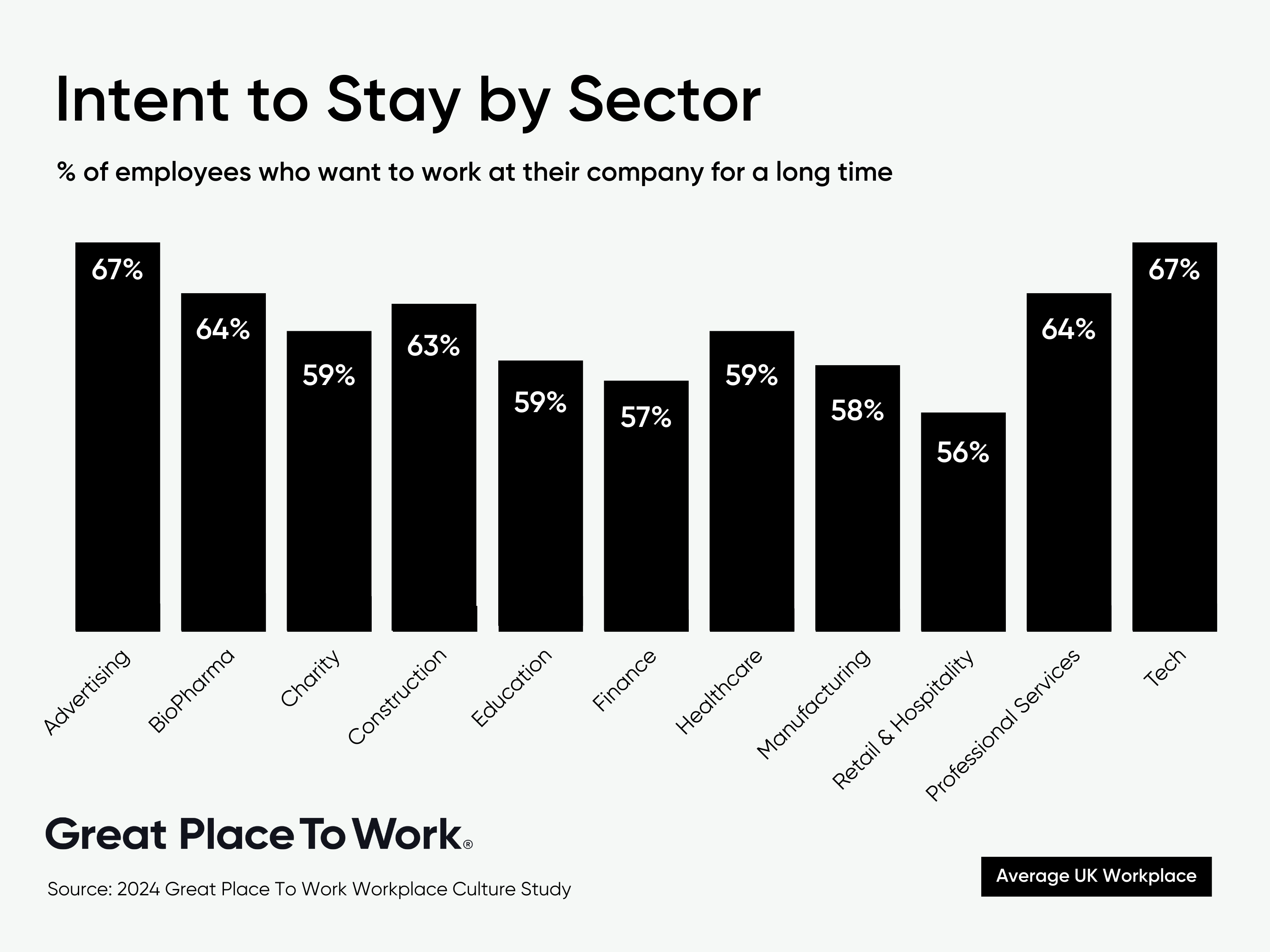
Methodology
Survey responses from employees at typical workplaces
Our UK Workplace Culture Population Study reveals the state of employee wellbeing across the United Kingdom.
Conducted in late 2023, Great Place To Work surveyed over 2,200 employees across 11 sectors. Employees rated their workplace against 60 statements in Great Place To Work’s Trust Index™ survey. The Trust Index survey is built upon 30 years of research and data on workplace culture and is taken by over 20 millions employees in 170 countries across the globe annually.
